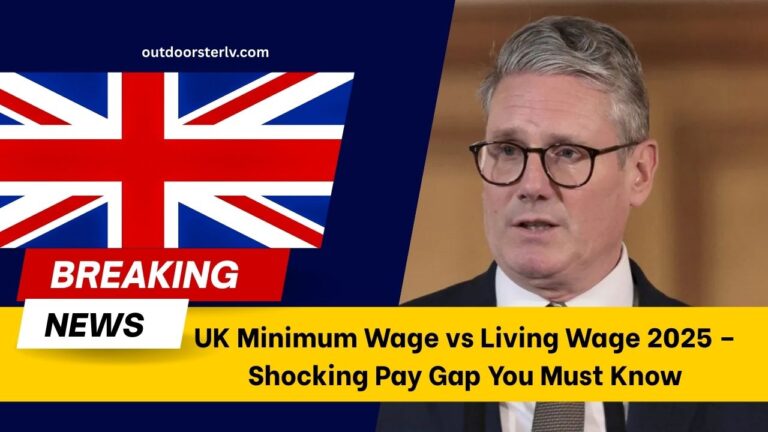The UK Minimum Wage vs Living Wage 2025 debate has once again become a hot topic as new pay rates come into effect this year.
Workers, employers, and policymakers are closely watching to see if wages are keeping up with the rising cost of living.
While the minimum wage is a legal requirement, the living wage—calculated by independent organisations—reflects what people actually need to afford housing, food, transport, and other essentials.
This year’s wage updates have sparked fresh discussions on whether the mandatory minimum wage is truly enough or if more employers should switch to the voluntary living wage to ensure fairness and financial stability for workers.
What Is the Difference Between Minimum Wage and Living Wage?
The minimum wage is the lowest hourly rate employers can legally pay workers, set by the UK government. The living wage, however, is voluntary and is calculated by the Living Wage Foundation based on real living costs.
The key differences in 2025 are:
- Minimum Wage: Legal requirement, applies to all eligible workers.
- Living Wage: Higher voluntary rate, based on the actual cost of living.
- London Living Wage: Even higher due to the increased cost of living in the capital.
UK Minimum Wage vs Living Wage 2025 – Pay Comparison
Here’s the official pay rate comparison for 2025:
| Category | Minimum Wage (2025) | Living Wage (2025) |
|---|---|---|
| National (23+) | £11.05 | £12.00 |
| Age 21–22 | £10.80 | £12.00 |
| London Living Wage | N/A | £13.15 |
| Age 18–20 | £8.00 | £12.00 |
Key Observations:
- The gap is largest for younger workers and those in London.
- Workers aged 18–20 legally earn as little as £8.00, but the living wage suggests they need £12.00 to meet basic living costs.
- In London, the recommended living wage is £13.15, reflecting higher housing and transport expenses.
Why the Difference Matters
This is not just a numbers debate—it’s about fairness and economic survival.
- Minimum Wage: Meets legal requirements but often falls short of covering rent, bills, and food.
- Living Wage: Gives workers more financial security, helping them meet rising expenses.
Supporters of the living wage argue it boosts staff morale, loyalty, and retention, while also improving a company’s public image.
Impact on Workers
Workers earning only the minimum wage may still struggle to afford essentials, particularly in high-cost cities. The living wage allows for:
- Better financial stability
- Reduced stress over bills
- Improved quality of life
For young workers, the difference between £8.00/hour and £12.00/hour can mean whether they can pay rent or need to rely on additional jobs or government assistance.
Impact on Businesses
While some employers worry about higher wage bills, paying the living wage can bring long-term benefits:
- Lower employee turnover → reduced recruitment costs
- Better staff performance → improved productivity
- Positive brand reputation → attracts talent and customers
Businesses must weigh short-term costs against long-term advantages when deciding whether to adopt the living wage.
2025 Wage Changes and Trends
In 2025, the statutory minimum wage increased, but not as much as the living wage. The Living Wage Foundation raised its rate to £12.00 nationally and £13.15 in London, citing rising rent and transport costs.
The growing gap has led to increased calls for reform, especially from trade unions and workers’ rights groups.
The UK Minimum Wage vs Living Wage 2025 discussion is more than just a pay comparison—it’s a reflection of how the UK values fair work. The minimum wage ensures a legal baseline, but the living wage sets a realistic standard for a decent life.
For workers, the difference can mean living comfortably versus struggling to survive. For employers, it’s about choosing between meeting the bare legal requirement or committing to fair pay that supports employee well-being and long-term success.
FAQs
What is the main difference between the UK Minimum Wage and Living Wage in 2025?
The minimum wage is a legal requirement set by the government, while the living wage is voluntary and based on real living costs.
Why is the London Living Wage higher?
London’s housing, transport, and living costs are significantly higher, so the Living Wage Foundation sets a separate, higher rate for the capital.
Do all employers have to pay the living wage?
No. Only the minimum wage is mandatory. Paying the living wage is voluntary but is seen as a good practice for staff welfare and brand reputation.

